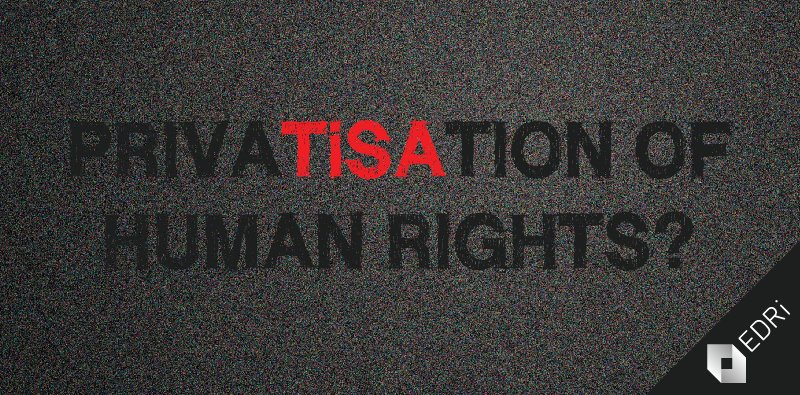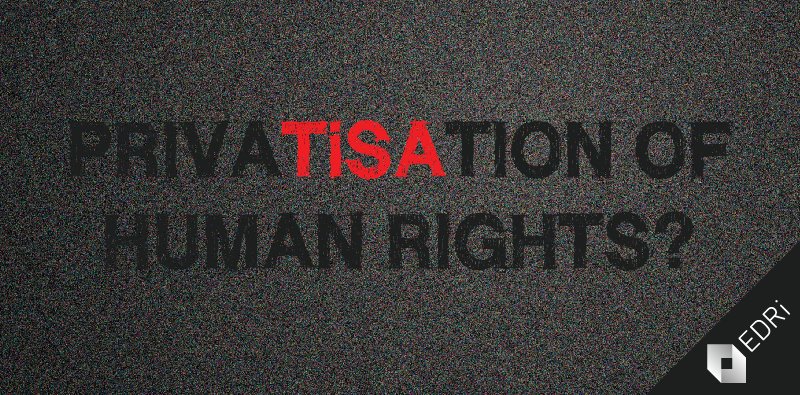El comunicado completo, en inglés, a continuación:
Dear negotiator,
The undersigned organizations would like to express their concerns and offer constructive suggestions concerning the Trade in Services Agreement (TiSA). In particular, we are worried about the provisions affecting citizens? personal data and privacy in the draft core text exceptions and the chapters on e-commerce, telecommunications and financial services.
Privacy and data protection laws are essential to preserve fundamental rights and freedoms. At the same time, they determine how businesses handle, use and manage personal information. The latest leaked texts revealed that the provisions on cross-border data transfers would grant unfettered powers to businesses. If adopted, governments would no longer be able to ensure that their citizens? data is processed fairly and lawfully, fully respecting human rights requirements. If this approach is not changed, TiSA would allow cross-border transfer of data without confirmation that the receiving country maintains an adequate level of privacy and personal data protection. The leaked text would also prohibit Parties from placing any restriction on the location of computing facilitates (or servers), confusing the very different issues of forced data localization and appropriate measures to protect privacy and data protection.
If TiSA Parties in future want to adopt measures to protect their citizens? privacy and individual freedoms online, they would do so knowing that they could be subject to legal challenge under trade rules. In practice, legislators would have their freedom restricted by a defensive need to be aligned with excessively narrow exceptions in TISA. In addition, the threshold tests in the leaked core exceptions language largely limit their application as an effective public policy safeguard. The general exceptions in the GATT and the GATS have only ever been successfully used to fully defend a challenged measure in one of 45 attempts at the WTO.[1] The privacy provision in that exception has even more restrictive language than the health, environment and public order grounds that were cited in those cases. A recent study [2] has confirmed that the general exceptions of the GATS are not strong enough to protect citizen?s privacy and data protection rights. Therefore, a change in international trade policy must be made.
We urge you to leave data transfer commitments out of TiSA. If, however you decide to proceed with such rules, we ask you to:
- oppose the proposed provisions on cross-border data transfers and so-called ?data localization?;
- ensure that the Parties to the agreement can condition the transfer and processing of personal data on the protection of privacy and personal data;
- allow any Party to suspend the flow of personal data if other parties to the agreement do not respect human rights requirements;
- ensure that the existence, application, modification and enforcement of measures relating to the rights to privacy and data protection are not subject to challenge on the basis of any trade agreement; and
- guarantee that parties to the agreement must not be required to apply or adopt ?least restrictive? privacy or data protection measures. Otherwise, the freedom to adopt measures aimed at protecting the individuals? right to privacy and data protection will be limited by potential legal challenge.

Decisions on privacy must be made by our society and not subsumed in trade discussions. We count on you not to give up on the protection of personal data and our privacy. This is key to ensure citizens? trust in trade.
[1] Only One of 4[5] Attempts to Use the GATT Article XX/GATS Article XIV ?General Exception? Has Ever Succeeded: Replicating the WTO Exception Construct Will Not Provide for an Effective TPP General Exception, Public Citizen?s Global Trade Watch, August 2015. Since the elaboration of this document, the count went up to 45 cases.
[2] Trade and Privacy: Complicated bedfellows? How to achieve data protection-proof free trade agreements? Kristina Irion, Svetlana Yakovleva, and Marija Bartl, Ivir Institute, University of Amsterdam.







